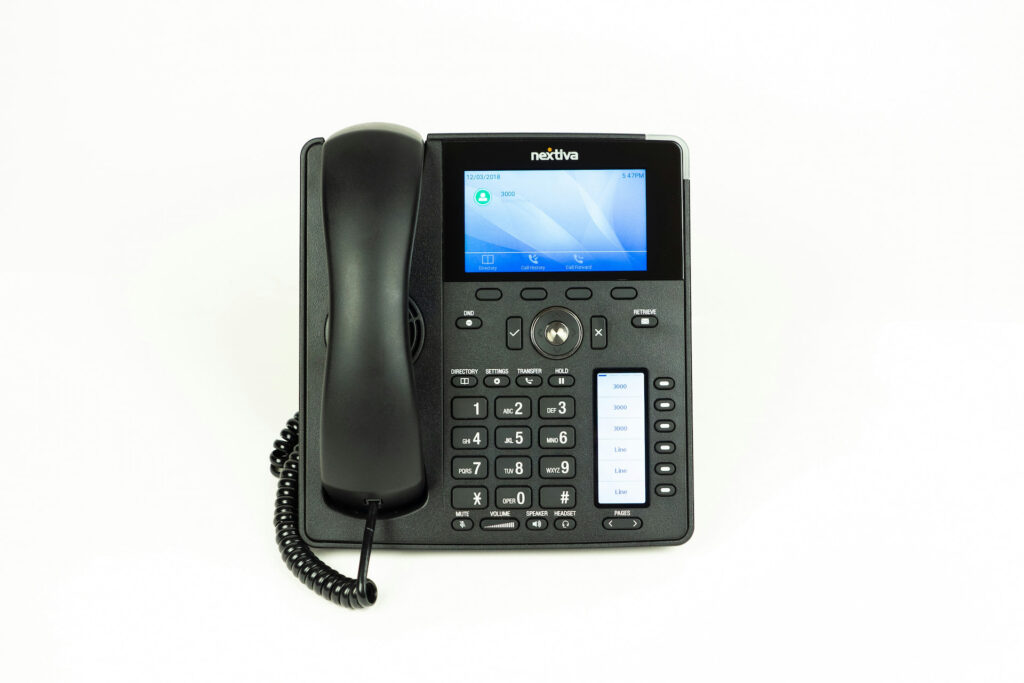In a business environment where seamless communication is a key driver of success, choosing the right business phone service is critical. This simple guide will help you make this critical strategic decision.
First, we explain the types of services available and unpack the pros and cons of each option.
Next, we’ll zero in on why VoIP emerges as the top choice for businesses. We’ll familiarize you with several of the exciting features available—and the limitations—in modern VoIP services.
Finally, we’ll navigate the complexities of selecting the ideal VoIP service, tailored to your company’s unique budget and needs.
Business Phone Services Options
VoIP Services
Pros:
- Cost-effectiveness: VoIP is generally affordable, especially for businesses making frequent long-distance or international calls.
- Advanced features: Features like voicemail-to-email, call routing, video calls, and integration with business applications are standard.
- Scalability and flexibility: VoIP services may be tailored to specific business needs and budgets and may be cloud-based to scale up or down as needed.
- Mobility: With an internet connection, employees can use their business number from anywhere, which is convenient for working on the road and invaluable for remote work and a distributed workforce.
Cons:
- Internet reliance: VoIP’s dependency on broadband internet connectivity means poor internet service may lead to low call quality or dropped calls. Internet outages can completely disrupt service.
- Vulnerable to power outages: VoIP systems may be compromised or disrupted during power outages, unless backed up by an uninterrupted power supply.
- Security and privacy risks: Being internet-based, VoIP systems may be vulnerable to cyberattacks and data breaches if not properly secured.
Traditional Landline Services
Pros:
- High reliability: Landlines have been the backbone of business communication for decades, and they’re known for their stable connections and consistent call quality.
- Ease of use: The familiarity of landlines makes them user-friendly, requiring little to no training for staff.
- Less vulnerable to outages: Landlines function independently of both internet and electrical services, ensuring communication during most outages.
Cons:
- Higher costs: Landline installation and maintenance, along with charges for long distance and international calls, are usually much more expensive than other options such as VoIP.
- Limited functionality: Landlines lack modern features such as video conferencing, digital voicemail, automatic call distribution, and integration with business software.
Inflexibility and scalability issues: Expanding landline infrastructure may be costly and time-consuming, posing challenges for growing businesses.
Hybrid Systems
Pros:
- Versatility: Hybrid systems (theoretically) merge the reliability of landlines with the advanced features of VoIP, offering a comprehensive solution.
- Customization: Hybrid systems may be tailored to specific business needs, providing a balance between traditional and modern communication methods.
Cons:
- Complex setup and management: Setting up, coordinating, operating, and maintaining two different systems simultaneously may be complicated, challenging, and resource-intensive.
- Increased costs: The need for dual infrastructure setup, coordination, operation, and maintenance usually leads to substantially higher expenses.
- Vulnerable to malfunctions: Because of the coordinated dual systems and added complexity, hybrid systems may have more problems across the board.
VoIP: The Smart Choice

In a comparison of business phone service options, VoIP emerges as the obvious choice due to its cost-effectiveness, flexibility and advanced capabilities. However, you must understand VoIP services to leverage their full potential.
Rich Feature Set
VoIP technology offers an impressive array of features for various business needs:
- Auto-attendant and interactive voice response (IVR) enhance customer experience by providing automated responses and routing calls efficiently.
- Call analytics and reporting offer insights into call volume, duration, and patterns to inform business strategies.
- Integration with CRM and ERP systems with customer relationship management and enterprise resource planning systems to streamline workflows and improve customer interactions.
- Multi-device compatibility allows employees to make and receive calls on various devices, including smartphones, laptops, and desktops, ensuring constant connectivity.
Limitations of VoIP
While VoIP offers numerous benefits, there are liabilities:
- Bandwidth requirements: VoIP requires sufficient bandwidth to avoid interruption and maintain call quality. Businesses must ensure their internet service can handle the additional load.
Emergency calls: VoIP services may have limitations regarding emergency calls since they may not provide precise location data to emergency responders.

Having an idea of the type of business phone service that makes sense for your company is the first step. The next step is choosing a VoIP service that aligns with your business requirements and involves several critical considerations:
Business Size and Growth Stage
- Small and medium-sized businesses (SMBs): SMBs should focus on VoIP solutions that offer essential features at a reasonable cost, with the flexibility to add more advanced features as the business grows.
- Large enterprises: Larger organizations may require VoIP solutions with extensive customization options, advanced security features, and the capacity to handle a high volume of calls.
Budgeting for VoIP
- Total cost: Consider both the initial setup costs and ongoing expenses. Some VoIP services may have lower upfront costs but higher monthly fees.
- Cost vs. value: Evaluate the value that each VoIP feature brings to your business against its cost. Investing in features that streamline operations and improve customer experience may offer substantial, long-term benefits.
Assessing Internet Infrastructure
- Internet speed test: Conduct a thorough assessment of your current internet speed and stability. You may need to upgrade your internet plan for optimal VoIP performance.
- Internet backup solutions: Consider having a backup internet connection to ensure uninterrupted VoIP service in case of primary internet failure.
VoIP Features: Essentials and Extras
- Core features: Identify and prioritize the key features your business needs, such as call forwarding, voicemail, and conferencing capabilities.
- Additional features: Determine which add-ons, like call recording or advanced analytics, could further enhance your business operations.
Security and Compliance
- Encryption and data protection: Ensure the VoIP provider offers robust encryption and data protection measures.
- Regulatory compliance: Check if the VoIP service complies with industry-specific regulations, such as HIPAA for healthcare or FISMA for finance.
Service and Support
- Customer support: Reliable customer support, including troubleshooting and technical assistance, is important. Assurance your business will receive timely, high quality support should be a top consideration.
Training and resources: Confirm the provider offers ongoing training resources to help your team adapt to the new system.

Navigating the options, features, costs, and companies in business phone services is challenging and may significantly impact communication efficiency, customer satisfaction, and overall productivity. Such strategic decisions warrant careful consideration.
By understanding the different types of business phone services, carefully considering the specific needs of your business, and acknowledging the unique advantages of VoIP in the modern business world, you can choose a VoIP solution that meets your current requirements and supports your future growth.
The right VoIP service transcends a phone system’s traditional role and becomes an integral part of your business ecosystem, enhancing connectivity, fostering collaboration, and driving innovation. Make sure your choice aligns with your business goals and enjoy the rewards as it transforms the way you communicate and operate.
Are you ready to upgrade your business communications?
Contact Oppuous today for a consultation and find the perfect business phone service for your organization.
Oppuous empowers organizations of all sizes by simplifying how they find, buy, and manage technology services. Our experts and engineers will help you every step of the way, but if you prefer a faster, autonomous approach, we also have a self-service portal where you can order any of our thousands of solutions. We put you in the driver’s seat.









